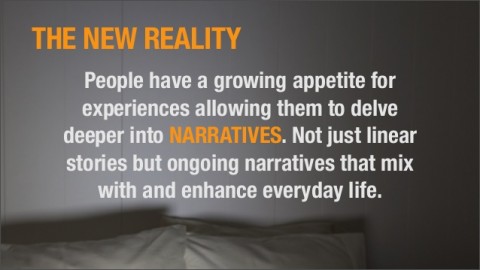Narrative Knitting Networks
August 12, 2015 Leave a comment“Narratives can create a very different world, one where pressure evolves from a source of stress to a source of excitement, calling us to achieve even more of our potential, both as individuals and collectively.”
– John Hagel
What follows is a slightly edited version of a post from a little over a year ago. It remains timely in terms of conversations I am currently having with a few different networks about the interest in engaging in not just communications work, but in changing consciousness. As abstract as it may seem to some, the power of robustly connected and distributed networks to create and promote new stories of who “we” are and what we might become can be critical to the work of social change.
Today’s post gives a tip of the hat and bow of gratitude to John Hagel for his work on narrative, which I believe has much to offer networks for social change. First a little story . . .
A regional network with which I have been working has been wrestling with what has to this point been called “a vision” for the region’s future. Part of this struggle owes to attempts to create something that can speak to a very diverse and complex range of interests. And part of the struggle, from my perspective, stems from what I see as the need to parse out and accentuate different elements that to this point have fallen under the rather broad heading of “vision.”
The vision in question essentially reads as a series of detailed scenarios pointing the way to alternate futures depending upon how overall contextual factors play out. Conversation about these scenarios has been intense, and occasionally rancorous, as different people/parties in the region have challenged one another’s assumptions and interests. That’s all well and good, to a certain point, as long as there is something larger that holds the whole together. This is where we might assume the more visionary elements of this “vision” might serve, that is, those parts that paint a bold and uplifting picture of what the region might accomplish together. As it turns out, while this has helped to fire some collective imagination, it also is true that there continues to be some reticence and those who have a difficult time seeing themselves in this proposed future. This, I believe, is because the vision does not yet have enough of an invitational and open quality to it (more “pull” than push).
And so I am suggesting that what may be required is precisely what John Hagel describes when he talks about narrative. In a blog post, Hagel contrasts narrative with story:
“Stories are self-contained – they have a beginning, a middle, and an end. Narratives on the other hand are open-ended – the outcome is unresolved, yet to be determined. Stories are also about me, the story-teller, or other people; they’re not about you. In contrast, the resolution of narratives depends on the choice you make and the actions you take – you will determine the outcome and you are therefore an integral part of the narrative.”
In other words, narrative has a strong quality of engagement, and it leaves room for various and diverse individual stories (and visions) to play out under its open and broad articulation. Hagel goes on to say that the best narratives inspire “exploring and connecting dispositions,” such that people want to figure out how they might fit, contribute, and work with others in the spirit of “crossing the finish line” together. And so I am compelled by this idea that in an age of diverse networks tackling complex issues there is more of a call for narratives that pull.
What might be an example of a network narrative? Something like this (following some institutional cases laid out by Hagel) –“Let’s grow the new (name of region here)! There is burgeoning interest in and activity around local economies in our region and people are tuning into the importance of health, community, and grounding in tangible assets in our work and lives. This comes at a time of both challenge (mounting economic disparity, social inequity and climate change) and opportunity (new technology, social networks, entrepreneurial spirit). It is clear that while local is important, it does not guarantee prosperity across our region. As we do our work, we are called to see the larger (regional) context and ask how we can both be fed by and feed the new (name of region here). Are you ready? Are you willing?”
Curious to get your take on the role of narrative in our networked world and in your network(s) for change. What possibilities and examples can you offer?

